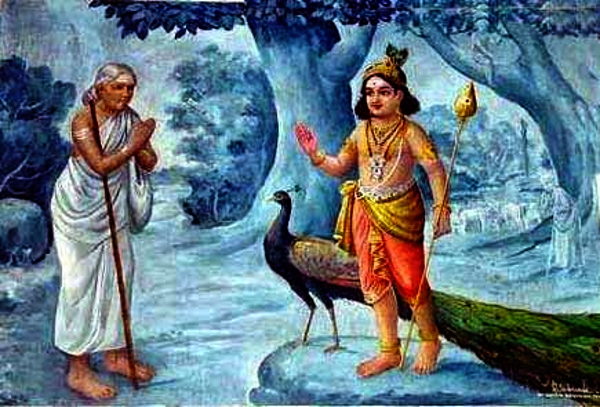Karthikeya / Muruga or Subramanya swamy, the jnanapandita was the destroyer of ignorance and pride, as both the characteristics are interlinked pride leads to ignorance and vice versa.
‘Avvai’ refers to a wise old woman. Avvaiyar, the most knowledgeable woman of the Cankam / Sangam age, She had written plenty of poems and had developed a huge ego. Lord Muruga wanted to challenge her and appeared as a shepherd sitting on top of the tree, proved her ignorance in a very simple incident.
Once when the learned lady was on her way to Madurai, weary with hunger and thirst, she rested under a java plum (Naaval) tree / blackberry tree. The lord Muruga in a guise of a shepherd boy asked her whether she wanted a hot or cold fruit ‘Sutta pazham’ or ‘Sudatha pazham’?” (Sutta has two meanings: one cooked and the other hot). When she wanted him to help her in getting fruits from the tree. Avvaiyar thought that the kid was blabbering something as she considered him to be illiterate, told him she wanted “Sudatha Pazham” (fruit that is not hot/cooked).
When the boy shook the tree, the fruits fell all over the ground. Avvaiyar started picking fallen fruits. She started to blow away the sand in the fruit before eating it (a gesture usually done to reduces the heat of edibles and blow the sand off the fruit). The gesture of blowing the sand in the fruit appeared as if the fruit was hot.
The boy then exclaimed, “Is the fruit, hot?”. Then the boy asked her why she had chosen the hot fruit instead of cold.
Avvaiyar had a realisation, she thought the boy to be illiterate, but he has taught her a big lesson. Moreover, she had a momentary pride and neglect in her mind thinking that the boy is illiterate and she was more knowledgeable. This incident made her realise that nobody should be underestimated. She also felt that this should be the act of the divine and requested the boy to reveal his true self. Then, the boy revealed that he was Lord Muruga and she worshiped him with joy. Her pride and ignorance vanished and she became simpler and more enlightened.
கருங்காலிக் கட்டைக்கு நாணாக்கோ டாலி
இருங்கதலித் தண்டுக்கு நாணும் பெருங்கானில்
காரெருமை மேய்க்கின்ற காளைக்கு நான் தோற்றேன்
ஈரிரவும் துஞ்சாதென் கண்
Karungaali Kattaikku Naanaa Kodali
Irunkadhali Thundukku Naanum Perunkaanil
Kaarerumai Meikkindra Kaalaikku Naan Thotraen
Eeriravum Thunjaathen Kann
Meaning; The axe that did not give in even for the hardest Karungaali tree, gave in for the tender stem of the plaintain ( Banana tree). I lost to the boy who herds cattle in the big forest, as a result my eyes will not sleep for two nights.
(Karungali Tree : The Cutch Tree; Hindi-Khair,katha; Kannada-Kachu; Sanskrit-Khadira; )
When a soul takes birth in this world, worldly bondage gets stuck to it like sand. To remove this bondage, just worldly education (knowledge) will not be enough, realization of God in one self, only will be able to remove this bondage.
There have been at least three Avvaiyars at various periods of Tamil history. The earliest Avvaiyar is believed to have lived in the Sangam period and her poems are found in the Purananuru, Kurunthogai and Natrinai. The second Avvaiyar lived in the 12th Century and was a contemporary of Kambar. Many poems and the Avvai Kural, comprising 310 kurals in 31 chapters, belong to this period. The third Avvaiyar is the most widely known for her ‘Vinayagar Agaval’ ,‘Aathi Soodi’, ‘Kondrai Vendhan’, ‘Nalvazhi’ and ‘Moodhurai’.
According to legend, Lord Vinayaka bestowed young Avvai with the looks of an old woman, as she did not want to be entangled in marriage. With her poems rich with common sense, she could easily impress kings and commoners. Kings valued her wisdom and wanted her to stay in their courts, but she refused to be bogged down. She was always a wanderer on the streets. Her moral uprightness gave her the courage to talk to kings on equal terms and correct them when they were wrong.
About Author:
Subhasini BA, is a Screenplay writer, Director, creative director, costume designer and producer, whose work has featured in some of the most prestigious film festivals in the country and internationally. She has collaborated on several film projects juggling different roles.
In beginning of her career, she worked as Associate director and Costume Designer with the acclaimed director Girish Kasaravalli. She’s written and directed a documentary film on the famed Krishna Temple in Udupi, and also written plays, screenplays for films and short form content for some of the leading technology companies in India, including Microsoft, Akamai Technologies, LAM Research, and SAP.
With Knowledge in Sanskrit, Subhasini is a seeker of the Eternal Truth / Santana Dharma, writes on dharma. She is passionate about History, Mythology, Philosophy and Spirituality. She believes Dharma is the manifestation of the natural strength of every living soul.
She lives in Cincinnati.
Image Courtest: Pinterest
You may also like
-
India Can’t Afford to Remain Stagnant at this Juncture, Says PM Modi; Asks People to Buy Locally-Made Goods
-
Stolen Artefacts to be Returned to India from Scotland Museums
-
Netaji’s Hologram Statue at India Gate
-
10th Century Stone Idol of Goat Head Yogini IllegallyRemoved from A Temple in Lokhari, Banda, UP Being Returned to India
-
UNESCO Inscribes ‘Durga Puja in Kolkata’ on the Representative List of Intangible Cultural Heritage of Humanity
